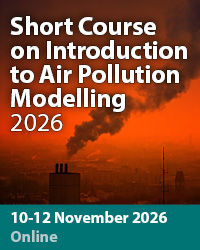Description
This course is particularly designed for managers and scientists with limited experience in air pollution modelling. All aspects of air pollution will be discussed: emissions, atmospheric processes, chemical concentration and deposition impacts, and adverse effects on humans and the environment. Then, in relatively simple terms, attention will be given to the available mathematical and numerical methods used to simulate, understand, and predict air pollution phenomena. Finally, the available software tools for simulating air quality matters will be presented, including the simulation of meteorological parameters needed for air quality analyses.
Participants will learn about all the major topics and challenges related to air pollution at short, intermediate, and continental scales (global climate issues will not be included). Participants will also learn about the availability and proper use of air pollution software and, in particular, the modelling tools recommended by regulatory agencies in North America and Europe. The advantages and limitations of models will also be discussed.
Course Programme
The course will run daily from 2 pm to 6 pm (GMT).
Day 1 – Tuesday 10 November 2026
- Atmospheric Processes and Air Pollution Meteorology
- Air Pollutants and their Emissions
- Atmospheric Dispersion
- Chemistry, Deposition, Adverse Effects
Day 2 – Wednesday 11 November 2026
- Air Pollution Modelling I – Dispersion
- Air Pollution Modelling II – Chemistry
- Odour Modelling, Indoor Modelling, Visibility Modelling, Receptor Modelling
- Review of Available APM Software
Day 3 – Thursday 12 November 2026
- Accidental Releases and Fire Plume Modelling
- Examples - Gaussian Plume Model Simulation Runs
- Modelling of Health Effects
- Other modelling issues - Discussion
Presenter

Dr Zannetti has performed studies and scientific research in environmental sciences for four decades. His activities have covered pure research in the fields of atmospheric sciences and numerical modelling, written publications, seminars and courses, project management, environmental consulting, editorial productions, and expert testimony. His major field of investigation and competence is air pollution. He has written more than 300 publications, and 40+ books and book chapters, including the book “Air Pollution Modeling”, completed in 1990, which was the first comprehensive book in the field and is still today a widely used textbook.
He has studied many air pollution cases throughout the world. In particular, in the first phase of his scientific career, he studied and modelled the air pollution affecting the city of Venice, Italy, and was the project manager in Kuwait of the first comprehensive air pollution study (monitoring and modelling) in the Persian Gulf. In the last 20 years, Dr Zannetti has investigated hundreds of accidental and regular releases caused by industrial, transportation, and agricultural activities, throughout the world.
He has often used computer models to simulate the transport and fate of atmospheric chemicals. In most of these cases, he simulated the ambient concentrations caused by the emissions using his own computer models (AVACTA II, MONTECARLO) and/or those developed and recommended by government agencies, such as the US Environmental Protection Agency (US EPA). In particular, he performed pioneering work for the development of new Lagrangian modelling techniques in which air pollution is simulated by computer methods using a series of independent segments, puffs, or particles.
He is often invited to present talks at conferences and seminars throughout the world. In particular, he has taught air pollution courses in Italy (University of Bari-Taranto), California (Berkeley Extension), Kuwait (Kuwait Institute for Scientific Research, KISR, and Kuwait Foundation for the Advancement of Sciences, KFAS), and at the Wessex Institute of Technology, WIT, where he is Professor of Environmental Sciences.
Dr Zannetti’s professional credentials have been certified with the title of Qualified Environmental Professional (QEP), given by the Institute of Professional Environmental Practice (IPEP). The QEP certification recognizes professional achievements for environmental professionals and their compliance with the highest of ethical and professional standards.
Wessex Institute: https://www.wessex.ac.uk/research/wit-staff/dr-paolo-zannetti
The EnviroComp Institute, USA: https://envirocomp.org/people1/zannetti.html
EnviroComp Consulting, Inc., USA: https://www.envirocomp.com/people/zannetti.html


 Wessex Institute
Wessex Institute